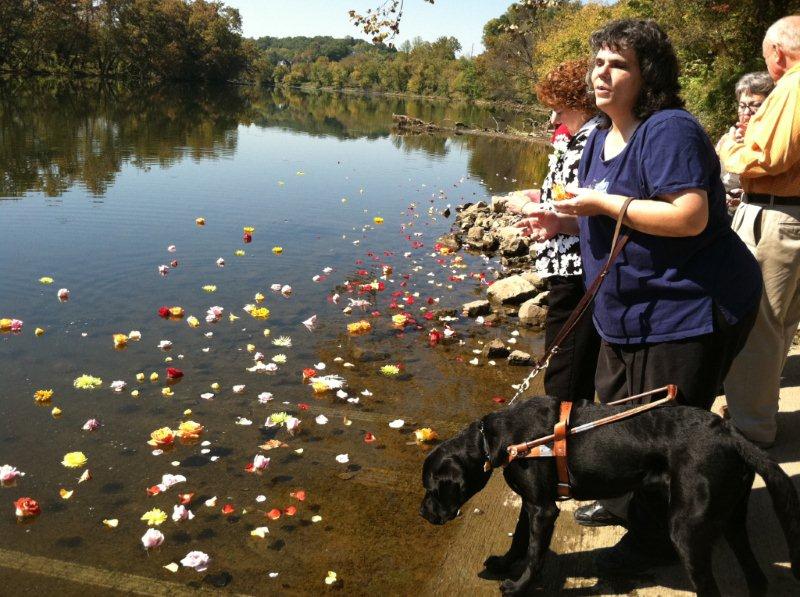Autism parents frequently have to do things that other parents don’t. Our kids are so different, what with their limited communication skills, their sensory challenges, and at times, their superhuman physical strength. It is impossible to parent a child with autism in the same way you would parent a typical child (which means that when you have both an autie and a typical child you have to adopt two different parenting styles, but that’s another post for another day).
In the beginning, it’s hard, knowing what to do. And in a way, it never really gets any easier. But there are things I have learned from experience, that are now second nature. Here are ten of my favourites.
- Drywall repair. Many auties, my son included, are headbangers. They may bang their heads out of anger or frustration, or simply to get attention. And then they bang their heads, they don’t mess around. They give the wall a good solid WHUMP that’s enough to make the room shake. The drywall invariably takes some punishment. The inside of my house looks a bit like a pitted golf ball, and there are places where the impact of my son’s head has caused actual holes – big, gaping holes.
- Mixed Martial Arts. My husband likes to watch Ultimate Fighter on TV, and although I don’t watch it myself, I have absorbed some of it through osmosis. This has proved invaluable in times when my son has had a meltdown. When most kids have meltdowns, they simply lose their tempers. When auties have meltdowns, they thrash on the floor, bash their heads on the closest hard surface, and can risk hurting themselves quite badly. Even as they are kicking and screaming, they have to be kept safe. Hence the MMA skills. I have become quite the expert at using my bodyweight to restrain my son from hurting himself. The difference between me and the Ultimate Fighter guys, of course, is that I try to avoid causing pain, I don’t get paid big money for my efforts, and I have a mental age that’s higher than my shoe size.
- Dishwasher Racing. My son hates – and I mean hates – for the dishwasher to be open. Anytime I have to unload it and repack it, I have to deal with this kid repeatedly – and with increasing volume – telling me to close the dishwasher. He plants his bum on the kitchen floor, right in front of the sink, so I cannot get to the dishes. Sometimes I actually have to slide him out of the way. I have taken to setting the oven timer whenever I start doing dishwasher stuff, and the idea that he can visually see how long it will take does seem to soothe him. But God help me if the dishwasher is not packed, closed and switched on by the time the timer expires.
- Stealth Hair Cutting. My son, like many other kids, dislikes haircuts. But he doesn’t dislike haircuts in the same way most other kids dislike haircuts. He dislikes haircuts in the same way most people dislike having a kidney forcibly removed while fully conscious and able to feel pain. Rather than risk traumatizing my child, I give him haircuts while he is sleeping. This involves a lot of patience, as I have to wait until he is very asleep. If he’s not asleep enough, he will wake up as soon as I touch his hair and he will scream loudly enough to startle the llamas in Peru. I have to creep around in the dark like a burglar, and sometimes it takes several nights to get the job done.
- Mediation. OK, this is a skill that any parent with more than one child has to learn. But when one child has autism and the other doesn’t, you have to raise your mediation skills to a whole new level. It’s a bit like trying to sort out a dispute between one person who only speaks Zulu and another person who only speaks Icelandic, when you only speak Pig Latin.
- Jumping Through Hoops Of Fire That Are Constantly Moving. OK, that may be a slight exaggeration. But dealing with school boards can really feel that way when special needs concerns are brought into the mix. I am getting really good at making suggestions to teachers and therapists that are phrased in a way that makes it sound like it was their idea. If it gets what my son needs, I really don’t care who gets the credit for it.
- Improv. If I had a dollar for every time a random stranger made a stupid remark about my son needing “a good hiding” or “proper discipline”, I’d have enough for a five-star trip to New Zealand, including flights, hotels, meals, and a Lord Of The Rings tour. I have learned the art of the Quick Comeback. If someone is being rude and intrusive while my son is having a hard time, I am no longer shy about saying things like, “My child has autism – what’s your excuse?”
- Distraction. This is a concept that most autism parents are well aware of. Sometimes I can just tell that a meltdown is just around the corner, and I want to do everything in my power to head it off at the pass. I get favoured activities or treats within arms’ reach, try to stop or somehow control whatever is winding him up, talk to him, sing to him, throw out mental arithmetic problems at him (the kid’s like Baby Rain Man with numbers – what can I say?) I have about fifty-fifty success with my efforts – but I will take that over ninety-ten in favour of the meltdown.
- Planning for Change. If there’s one word that makes autism parents everywhere tremble with fear, it’s change. Our kids don’t do well with change. They like the same places, the same people, the same routines. When we go on vacations, we have to take most of our family’s belongings with us so that we can replicate our home environment as closely as possible. Every summer, we put together social stories in preparation for the new school year, that include pictures of the new teacher and classroom, and we take our son to the school so he can get used to – or stay used to – playing in the playground there. I contingency-planned my wedding like it was going out of style – and all of those efforts paid off.
- Appreciating the Little Things. Where an autism parent is concerned, there is no such thing as a small accomplishment. All achievements, ranging from new words added to the vocabulary to giant cognitive leaps, are causes for celebration. As the parent of a child with autism, I have really learned how to smell the roses. Life is full of challenges for me and my family. But every single day is a blessing, and every single night, when I kiss my children goodnight, I am grateful for the people they are. And no matter how hard the day has been, I feel like the richest person on the planet.











